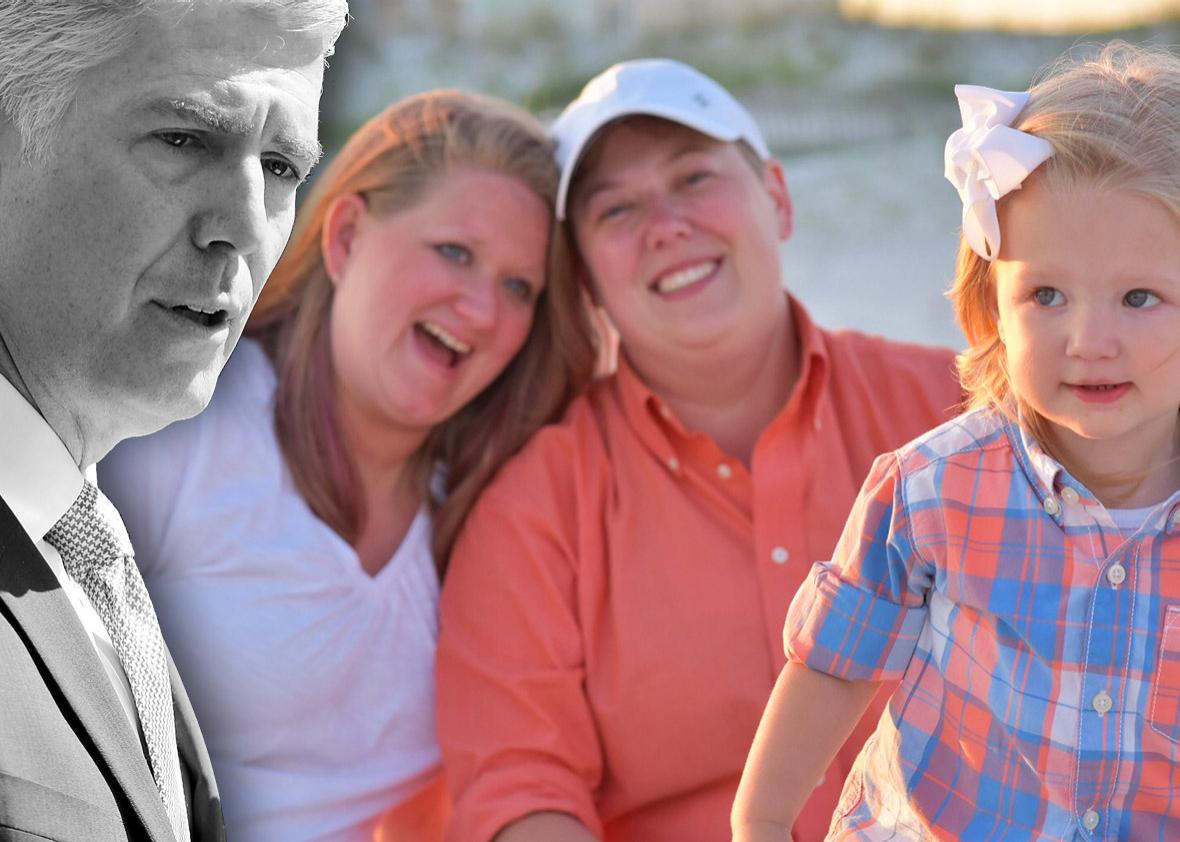On Monday, the Supreme Court ruled the Constitution requires states to list same-sex parents on their child’s birth certificates. The decision was predictable: In Obergefell v. Hodges, the court held that states must extend “the constellation of [marital] benefits” to same-sex couples, and specifically mandated equal treatment with regard to “birth and death certificates.” Yet Justice Neil Gorsuch refused to accept this principle, dissenting from the court’s ruling along with Justices Clarence Thomas and Samuel Alito. Gorsuch’s dissent is legally incoherent and factually inaccurate—an amateurish effort to justify anti-gay discrimination through deeply dishonest analysis and an outright untruth.
To understand why Gorsuch’s dissent is so misleading, consider the facts of the case itself. Terrah Pavan conceived a child via artificial insemination and gave birth in Arkansas. Her wife, Marisa, was by her side when she gave birth. Under Arkansas law, a birth mother’s husband is listed as her child’s father—that’s the case even if the mother conceived using a sperm donor, and her husband is known not to be the biological father. In light of this rule, the Pavans asked Arkansas to list Marisa as their child’s second parent. But the state refused, simply because the Pavans are a same-sex couple.
The Pavans sued, along with another lesbian couple in an identical situation, citing a clear violation of Obergefell. That case, they pointed out, held that states must provide marriage rights to same-sex couples “on the same terms and conditions as opposite-sex couples.” The Arkansas Supreme Court ruled against the Pavans, citing the state’s interest in recording “biological parentage.” On Monday, the Supreme Court reversed that decision. The court noted that Arkansas law already “makes birth certificates about more than just genetics,” allowing non-biological parents to be listed on birth certificates—so long as they are heterosexual. By denying this same benefit to same-sex couples, the state was engaging in “disparate treatment” prohibited by Obergefell. From now on, Arkansas (and every other state) must extend birth certificate benefits to same-sex and opposite-sex couples equally.
In his dissent, Gorsuch made two counterarguments, neither of which is even remotely plausible.
First, he wrote that the court should have dismissed the appeal because “in this particular case and all others of its kind, the state agrees, the female spouse of the birth mother must be listed on birth certificates too.” What? That issue lay at the heart of this case—but Gorsuch has it exactly backward: Arkansas explicitly refused to list “the female spouse of the birth mother” on birth certificates. That’s how the case wound up at the Supreme Court in the first place.
I asked Shannon Minter, legal director of the National Center for Lesbian Rights—which represented the Arkansas plaintiffs—what he made of Gorsuch’s assertion.
“That’s just completely wrong,” he told me. “It is patently untrue. Arkansas refused to put the female spouse of a birth mother on the birth certificate. The Arkansas Supreme Court upheld the policy, and the state would not issue birth certificates that listed both same-sex parents.” Minter should know; he represented two couples who were denied the right to “legally accurate” birth certificates.
On Tuesday, I reached out to the Supreme Court’s public information office to ask whether Gorsuch planned to correct this error. A spokeswoman for the court told me that “as a matter of policy the Court does not comment on its opinions, which speak for themselves.”
Second, Gorsuch wrote that the plaintiffs’ challenge was incorrect: He insisted they should have challenged the “artificial insemination statute,” not the state policy refusing to list same-sex parents on birth certificates. This reasoning makes no sense. The plaintiffs cited the artificial insemination statute only to prove that Arkansas already listed non-biological parents on birth certificates. They had no desire to overturn it; they merely used it as evidence that Arkansas was not extending a key marital benefit to same-sex couples. Did Gorsuch simply not understand this extremely basic aspect of the case?
“I think he’s deliberately trying to muddy the waters,” Minter told me. “The plaintiffs in this case brought their challenge in under a statute that very plainly provides that when a child is born to a married woman, her husband must be named on the child’s birth certificate. We went to court to challenge the gendered limitation of that statute, arguing that, under Obergefell, the law has to be applied equally to married same-sex couples. We had absolutely no reason to challenge the artificial insemination statute.”
So what was Gorsuch attempting to accomplish with his dissent?
“Gorsuch is plainly still attempting to revive the biological rationale for treating same-sex couples differently,” Minter said. “I think he’s trying to provide a road map for hostile state courts by suggesting that they should go back to these biological justifications. He wants to recast family law in this narrowly biologistic way that’s reverse engineered to exclude gay people. But that’s not going to work, because state family law is not just about biology. There is no state in the country that limits either legal parentage or birth certificates to biological parents.”
It’s instructive to compare Gorsuch’s dissent to those of his mentor. Justice Antonin Scalia’s anti-gay dissents were consistently nasty, outrageous, and heartless, but at least he acknowledged his core belief that the Constitution does not prevent states from demeaning and degrading gay people. Gorsuch attempts to conceal this unpalatable view by claiming, falsely, that Arkansas has “a birth registration regime based on biology” and “rational reasons” to exclude same-sex couples. That’s pure nonsense, and Gorsuch surely knows it. If the justice is going to rule against gay people’s constitutional rights, he should at least have the courage to own up to his convictions.
